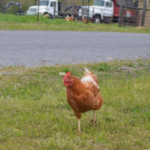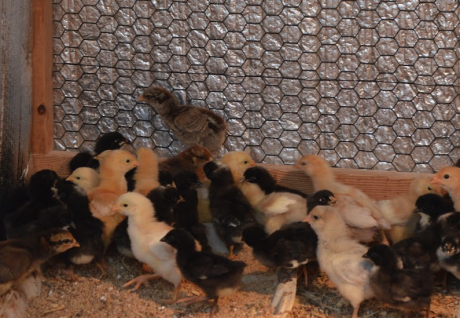Weld: A Raw Deal
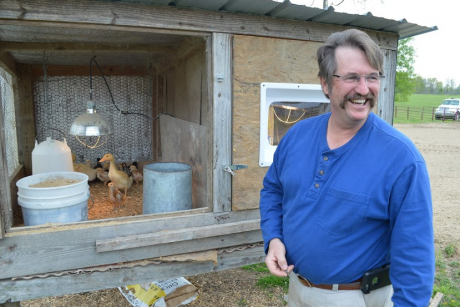
Johnathan Buttram opens a small chicken house for his free-range chickens and several ducks that will be a gift for his grandson. Photo by Cody Owens.
The practice of contract farming now accounts for all the poultry produced in Alabama — but it’s not always good for the farmers.
Two days before he suffered a heart attack, Johnathan Buttram rummaged around his living room, looking for a DVD. “God, I hope I haven’t lost it. This video is as good as gold,” the mustachioed chicken farmer said, moments before he seemed to remember its whereabouts. He unlocked a safe and pulled out a disk.
“You’re not going to believe this, so I want you to watch the whole video so you can say you’ve seen it,” Buttram said as he popped the disk into the player under a large flat screen TV.
The video was recorded with a night vision lens from a distance outside the Koch Food processing plant in Chattanooga, where Buttram’s birds would be taken after staying on his farm for several weeks.
“That’s the weighmaster. He’s in charge of weighing and handling all the chickens,” Buttram explained, pointing to a man standing near a doorway on the left side of the frame. A truck with a load of Buttram’s chickens pulled into the frame and the man momentarily disappeared inside the doorway. As the truck pulled onto the scales that weigh each truckload of chickens, a front loader could be seen approaching from behind.
“Okay, you see this? It’s illegal for them to even be on the property during work hours,” Buttram said as the front loader in the video lifted the back end of the truck. “They’re taking some weight off the truck so it will be lighter. They are blatantly stealing from me right here.”
Already suspicious, Buttram had hired a private investigator to set up video surveillance. By his own estimate, he lost more than $20,000 just in the instances recorded on video over the course of several months in the fall of 2009.
Two days after sharing this video with a reporter, Buttram suffered a heart attack and has been in the hospital recovering. “This just goes to show you how stressful it all can be raising chickens,” Buttram said over the phone from his hospital bed a day after being admitted. “I just want people to know about what goes on in this industry and how much it can weigh on folks.”
Buttram’s plight is not uncommon, according to those who advocate for an overhaul of the current system of contract farming that is responsible for 100 percent of the chickens produced in Alabama and 97 percent of all poultry production in the United States.
Contract farming refers to the agricultural practice of a company entering into an agreement with a private farmer to raise livestock, with the idea that the farmer will then be responsible for required upgrades to the facility and meeting any other necessary conditions, which can lead to massive debt. The company owns the livestock and the farmer owns the land and equipment necessary to produce plump, healthy animals — in this case, chickens.
It is not uncommon for farmers to take out $1 million loans in order to build houses and obtain a contract with a major company like Tyson or Pilgrim that control a large portion of the market.
In this system, farmers are entered into a tournament-style competition that pits them against each other when it comes to producing the most profitable chickens. There are financial incentives for being at the top; farmers who find themselves at the bottom face pay deductions (which go toward the bonuses of farmers on top) and may even be at risk of a company voiding their contract if their poor standings persist.
However, in this system farmers are not responsible for two main factors in how well they will fare in the tournament: the quality of the chickens they receive and the quality of feed that is delivered to them.
A generation ago, before the practice of contract farming took over, the majority of farmers in Alabama (and elsewhere) owned their own chickens. Now, there is not a single privately owned chicken farm in the state.
Counting ChickensIt may not come as a surprise that chicken production in the United States has been on the rise in recent decades. In 2014, “the combined value of production from broilers, eggs, turkeys and the value of sales from chickens was $48.3 billion, up 9 percent from $44.4 billion in 2013. Of the combined total, 68 percent was from broilers [chickens], 21 percent from eggs and 11 percent from turkeys,” according to the United States Department of Agriculture.
Alabama is located in what is considered America’s “chicken belt,” which accounts for a majority of the poultry produced in the country. In 2013, roughly 1.04 billion chickens came from Alabama farms, second only to Georgia, which produced about 1.3 billion chickens. In 2014, that number was up to 1.06 billion chickens in Alabama, according to USDA data.
Poultry and egg production in Alabama accounts for 65.6 percent of agricultural commodity sales in the state, bringing in over $3 billion dollars in annual sales. Comparatively, the second largest farm product to come out of the state is cattle, which only accounts for 8.4 percent of the total agricultural sales in the state, according to Alabama Agribusiness Council.
In the processing sector, poultry accounts for 40.3 percent of the sales in Alabama, bringing in $5.2 billion annually.
DeKalb county, where the Buttram farm is located, is the second largest producer in the state, accounting for about $458.7 million in annual sales. There are roughly 2,426 farms in the county on about 235,322 acres of farmland and provides roughly 34,073 jobs.
“Pluses and minuses”
“When it comes to contract farming, some people are successful and some people aren’t. That’s just the bottom line,” Ray Hilburn said. Since his father began farming in 1955, the business of raising chickens in Alabama has become an increasingly expensive venture for those looking to carve their way into the market.
Hilburn was born and raised on an Alabama chicken farm. He currently owns and operates four chicken houses with his brothers in Crenshaw County and has a contract with Pilgrim’s Pride, the largest producer in the United States. “There are definitely pluses and minuses to contract farming,” Hilburn said. “My father started out as an independent producer and we paid for our houses in about three years. If we had been in it 10 years after that we would’ve gone out of business because processing prices skyrocketed.”
Contrary to Buttram’s view on contract farming, which is decidedly negative, Hilburn thinks the tournament-style competition is a good thing for the industry.
“Everyone is paid the same based on [their] per-pound performance,” Hilburn said. “That’s what I like about it, I like competing — just like in sports. I like to beat anyone I’m up against that week, and I like to beat my own performance from previous weeks. Everyone talks like they want to get paid the same, but if you have a guy with a four-pound bird and I have a four-pound bird and it took less feed for me to grow mine, I think that takes the competition out of it and gives me no incentive to do better. I like to think I can outwork somebody else.”
Hilburn scoffed when asked if farmers are afraid to speak out about the conditions of their contracts. However, despite being under contract himself, Hilburn couched his statements about the industry around his son, who recently took out roughly $1.5 million in loans to start his own poultry farm with four houses.
“He works on average about 3.5 to 4.5 hours a day. But that’s 7 days a week. That may be at 2 [a.m.] if the alarm goes off and something is wrong with a chicken house. He owes so much money that he’s going to go down and take care of it. If you don’t owe that much or aren’t a motivated person, you might not go and check on it and that will cost you because the conditions aren’t good,” Hilburn said. “It’s stressful. It’s stressful to me when my son owes that kind of money.”
He estimated that his son, Christopher Hilburn, makes roughly $60,000 a year farming chickens, “and most everyone makes about that much.”
If raising chickens is so profitable — as companies make it seem to farmers looking to sign a contract — then why don’t companies do it themselves? Hilburn believes there is no incentive for hourly workers to properly take care of the birds.
“They tried to do that a while back and it didn’t work out,” Hilburn said. “They’d be paying somebody by the hour to watch those chickens. If water or a feeder isn’t working in that house, a guy might not fix it because he’s getting paid the same no matter what. Whereas if you owe $1.5 million, like my son, you’re going to get out there and fix the problem because it’s costing you money. That’s why contract farming works and why companies can’t pay for that kind of stuff and get it done properly.”
Despite being overwhelmingly in favor of the current system, Hilburn admitted that he encourages poultry farmers to get a second job because, “You can’t make a living just out of the chicken business.”
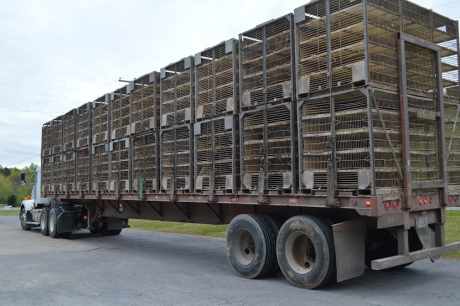
Large trucks carrying thousands of chickens are a common sight in DeKalb County, which is the second largest poultry producer in the state. Photo by Cody Owens.
“The Chicken Mafia”
Buttram Farms is situated on 158 acres just outside of Geraldine, Alabama, down several long, serpentine county roads. Signs reading, “Tyson,” “Pilgrim” and “Koch Foods” sit along the road, marking the farms that hold contracts with the companies. Large trucks carrying thousands of chickens make their way down the narrow country roads on a daily basis.
For three generations the Buttrams of Dekalb County have raised chickens for a living. Now, after 38 years, Buttram is looking for a way out of the business. He’s grown tired of fighting “the chicken mafia,” he said, adding that poultry farmers in Alabama and elsewhere have become beholden to the large distributors.
Since 2009, Buttram has become a self-described advocate for poultry farmers and has been featured in several documentaries, as well as John Oliver’s HBO show, Last Week Tonight, which investigated contract farming last year.
Like Hilburn, Buttram’s father owned all of the birds and was an independent farmer. A generation later, there are no more independently owned poultry farms in the state.
If a contract is terminated — which can happen with only a 90-day notice and without explanation — farmers can be left with no way to make money because they do not own the chickens, only the land and equipment. “I know too many people who’ve lost everything.” Buttram said.
When a disaster happens, such as a flood or a tornado, the companies are not contractually responsible for disposing of the dead chickens. Farmers must handle the carcasses themselves, which can lead to contaminated water sources and other environmental hazards.
“People don’t want to speak up because they are afraid they are going to be retaliated against by some of these companies,” Buttram said. “Just take a look at my 1099s and you’ll see what I’m talking about. I’ve been losing money since I opened my mouth. This is a real problem for farmers like us.”
Because there is no legal protection for farmers who decide to speak out against chicken companies, finding farmers willing to discuss issues that may arise from contract farming can be hard. Just ask Mary Johnson, director of news services for the Alabama Farmers Federation.
When initially approached for this story, Johnson said it would not be a problem for her to wrangle farmers willing to talk about their farms. When given the specific questions about contract farming and the lack of legal protection for outspoken farmers, Johnson replied in an email: “I am not aware of any poultry producers who would feel comfortable being interviewed about these topics. As a membership organization, we advise our members to not do interviews off-the-record or anonymously.”
Buttram was not surprised to hear this. Unlike other poultry farmers who may fear speaking out, “This farm is bought and paid for,” Buttram said, as he walked along the chicken houses on his property. “People who don’t speak up are afraid they’ll lose everything, but the companies don’t have that kind of leverage with me.”
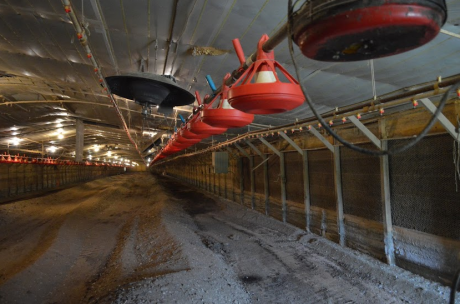
The chicken houses on Buttram’s farm are 16,000 square feet. They can house up to 30,000 chickens at any given time. This photo was taken when he was in between flocks. Photo by Cody Owens.
“No Mistaking What’s Going On Here”
Since the incidents with the front loaders manipulating the scales were caught on video, Buttram said that he has been on the receiving end of retaliation tactics by the company he still does business with (while Buttram still has a contract with Koch Foods, the chickens that he raises are now processed at a plant in nearby Collinsville, Alabama, not Chattanooga where the video took place) because he decided to come forward with the findings.
According to Buttram, chicken deliveries have been inexplicably delayed and he’s gotten “diseased” chicks and subpar feed provided by Koch, which directly impacts his standing in the tournament and subsequently, how much he’ll be paid.
“Most people don’t believe me when I tell them this, but here it is. You can see it. I have the proof,” Buttram said referring to the video that he says shows a company clearly cheating him on his pay. “There is no mistaking what’s going on here.”
The video is about 18 minutes long and details multiple incidents of the company manipulating the scales over the course of several months. Since then, the company has put up a screen to block the view of the area where the chickens are weighed, Buttram said.
“If they can do this, then how come I can’t go to Walmart, load up a buggy and push it out the door? What’s the difference? Other than I would only get away with a few hundred dollars and they’re stealing millions from people like me,” Buttram said.
Buttram said he has personally shown the video to both the U.S. Department of Justice and Gov. Robert Bentley, and thus far nothing has happened. “I had an hour to talk to the governor a while back and I showed him the video. He watched and slammed both his hands on his desk and said, ‘Something needs to be done about this. What can I do to help?’ But I never heard back from him after that meeting,” Buttram said.
“When the Koch people saw the video — I had a friend of mine take a copy to them and show them — they gave us all kinds of excuses for what happened in the video,” Buttram said.
Neither representatives for Koch Foods or Bentley’s office responded to calls or emails requesting comment.
“At the bottom this time”
On February 7, an explosion leveled the JCG Feed Mill in Rockmart, Georgia, leaving one person dead and five seriously injured. As it happened, that was the mill where Buttram’s chicken feed came from.
Officials with the U.S. Bureau of Alcohol, Tobacco, Firearms and Explosives blamed a buildup of dust for the explosion. No criminal charges have been filed. The Rome News-Tribune estimated the explosion left about $3 million in damages to the facility.
As a result, Koch Foods had to outsource their feed from competitors in order to provide for the chicks that were delivered to farms. “They gave us cracked corn. It was no good for the chicks,” Buttram said. “I ended up being at the bottom of the bracket this time because of the feed they delivered to me.”
Issues like this are outside the control of the farmers and can result in a substantial pay reduction. Buttram estimates he lost about $5,000 on this round of chicks because of inadequate feed he received.
“The Meat Racket”
While working as a reporter for the Columbia Daily Tribune, Chris Leonard described his first experience on a Tyson factory farm in Arkansas with 75,000 chickens on the ground as “awe-inspiring.” Since then, Leonard has worked as an Associated Press reporter, covering the ins and outs of America’s corporate meat industry and has written a book about his findings, The Meat Racket: The Secret Takeover of America’s Food Business.
Leonard said after that day he became captivated by the food industry. “I moved down to Arkansas as a reporter and started going out into these small towns and seeing how these chicken farmers were being completely exploited — totally powerless — and at a complete disadvantage to these super powerful firms and that whole power dynamic fascinated me as well,” Leonard said.
The industry hasn’t always been controlled by a few large companies. It wasn’t until the major industry consolidation that took place in the 1980s and ‘90s that contract farming really took hold. The larger distributors began to buy out the competition, eventually transforming the industry into what it is today: two major companies, Tyson and Pilgrim’s Pride, controlling 40 percent of the poultry market in America.
By contrast, 36 companies controlled that much of the market in the 1970s, Leonard explained. “We made a huge mistake in this country in the ‘80s and ‘90s,” he continued. “We let these vertically integrated poultry firms go on a merger spree and buy each other out. These major companies had complete strategies geared toward buying out the competition. One after another, with bigger and bigger mergers.”
The results were both predictable and disastrous for independent farmers who now had fewer companies to do business with. They could not compete against the major companies who held the bargaining power.
After hearing about Buttram’s situation, Leonard was incensed, but not surprised. Situations like that are widespread, he said. “These farmers are vividly aware of the power that these companies have over them if they go to the press or they go to a lawyer. It’s been proven time and time again that these companies can get away with it.”
As for the tournament-style competition that farmers deal with daily, Leonard said it is a tactic used by the companies to divide and conquer. “If you get 100 farmers in a pool and they all deliver their chicks in one week, the top half get a bonus, the bottom half get a pay cut. What’s critical is that the bonus given to the top farmers is pay taken directly from the bottom farmers. It’s a zero-sum game,” Leonard said.
“It divides farmers against each other. One person’s bonus is another person’s pay cut and they know it. That stops them from working or communicating with each other.”
After 20 years of covering the meat industry, Leonard says one of the most discouraging moments in his career happened in 2010 after the USDA attempted to overhaul the current system of contract farming by giving growers a level playing field against companies and offered legal protection through a congressional bill. Lobbyists blocked any attempt for changes to be implemented.
“In 2010, through lobbyists, the industry completely dismantled the effort and inserted this rider into the Farm Bill [essentially] stopping the USDA from doing their job to protect farmers from abuse like this,” Leonard said. Each year since then, the rider has been inserted into the bill and nullifies the changes that were proposed.
This is still a major point of contention for those opposed to the current system of contract farming.
“Just the Way the System Is Rigged”
The Grain Inspection Packers and Stockyard Agency (GIPSA) is in charge of protecting the Packers and Stockyard Act, which was originally passed in 1921 and provides certain protections for farmers.
The term “GIPSA rider” is commonly used by those in the meat industry when referring to the legislative tactic used by members of the United States Congress to delay rules instituted by the USDA in 2010’s Farm Bill to protect farmers against corporate overreach.
Each year since, a rider has been inserted into the bill and has effectively stalled any changes from taking place. In the coming weeks, the House Agriculture Appropriations Subcommittee will consider a bill that will more than likely have a version of the rider attached, nullifying any new regulations, Leonard said.
“I don’t want to be pessimistic,” Leonard said. “I don’t think this is the permanent state of affairs. But this guy took video evidence of him being cheated by a company to the governor and the [Department of Justice] and nobody did anything. That’s just the way the system is rigged right now. But people are becoming more and more aware of what’s going on and maybe that can change the political picture.”
Alabama Farmers Federation
In 1921 the Alabama Farmers Federation was formed on the campus of Auburn University after a group of farmers decided they wanted to have a stronger voice in matters of policy and regulation. As a membership organization, there are currently about 2,500 farmers who make up the AFF.
“Any time a farmer has an issue, we want to help them,” Mary Johnson, spokesperson for the Alabama Farmers Federation, said over the phone.
Johnson cites a specific instance two years ago when there was a shortage of propane gas to heat the houses during the winter. As a result, some chickens died and farmers began to feel the financial strain. “I can’t tell you how many meetings we sat through with the Propane Gas Association and Governor Bentley, people who could affect change, to get these farmers the propane they needed,” Johnson said.
As for Johnson’s previous comments about farmers not wanting to speak on record about contractual issues, her boss, Jeff Helms, AFF’s communications director, explained that while the organization always works to help reporters get in touch with farmers, questions like that would put members in a potentially compromising situation.
“The questions you submitted to us led us to believe your story was going a particular place that could put one of our members in a challenging position and that is a different kind of deal than trying to find a farmer to talk generally about life on the farm,” Helms said.
Asked if the AFF could or would do anything about Buttram’s situation, Helms responded, “While I understand that growers are not going to agree with everything involved in their contract with their particular integrator, those are issues between that individual grower and the company they are growing chickens for.
“Our role is to work on more global issues — issues that affect all the farmers and not necessarily get into a dispute between a grower and someone they are working with,” Helms said. “We’re trying to work on the big issues that will hopefully make our farmers be more successful because their success makes all of us Americans have a safe, affordable and abundant food supply.”
“I Just Wanted to Feed People”
The three generations of Buttram chicken farmers will end with Johnathan, according to his son Zack who has already begun to gravitate toward the cattle business. He has several dozen cows he tends to on a nearby plot of land.
“I love the cows,” Zack said. “I wouldn’t want to get into the business of raising chickens because I see the trouble it causes.” After his father’s heart attack, Zack’s feelings have solidified even further.
Now out of the hospital and recovering at home, the elder Buttram said on Monday he already has a swarm of bees that has colonized in one of his hives. He hopes to have about 100 hives eventually.
“When I first got some bees a while back, I saw the impact it had on my garden just having them around.” Buttram said, standing in a field not far from the hive. “ I had the biggest tomatoes I’ve ever seen after one season with the bees. I don’t know, there was just something about that that stuck to me and reminded me what farming is about,” Buttram said. “I want to take care of the land. That’s what farmers are meant to be, not corporate pawns. For the rest of my days I’m going to try and straighten out what’s gone wrong.”
Buttram has always considered himself to be a steward of the land and speaks spiritually of his role as a farmer. “Did you know only 2 percent of people are responsible for providing food for the whole world? I was never in it for the money. I just wanted to feed people. That’s really what it’s always been about if you want to get down to it.”
